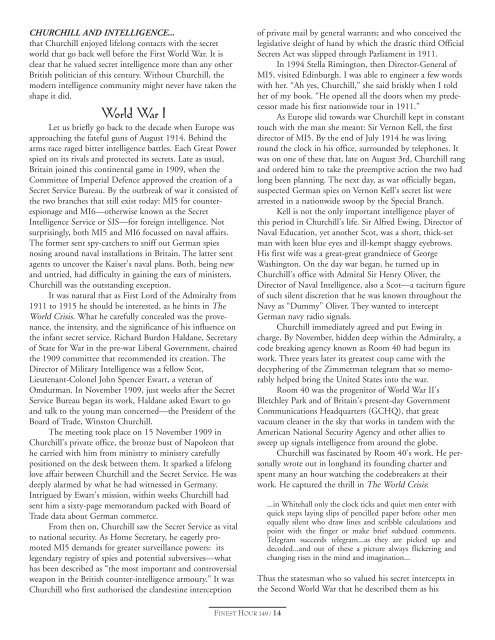You also want an ePaper? Increase the reach of your titles
YUMPU automatically turns print PDFs into web optimized ePapers that Google loves.
CHURCHILL AND INTELLIGENCE...that <strong>Churchill</strong> enjoyed lifelong contacts with the secretworld that go back well before the First World War. It isclear that he valued secret intelligence more than any otherBritish politician of this century. Without <strong>Churchill</strong>, themodern intelligence community might never have taken theshape it did.World War ILet us briefly go back to the decade when Europe wasapproaching the fateful guns of August 1914. Behind thearms race raged bitter intelligence battles. Each Great Powerspied on its rivals and protected its secrets. Late as usual,Britain joined this continental game in 1909, when theCommittee of Imperial Defence approved the creation of aSecret Service Bureau. By the outbreak of war it consisted ofthe two branches that still exist today: MI5 for counterespionageand MI6—otherwise known as the SecretIntelligence Service or SIS—for foreign intelligence. Notsurprisingly, both MI5 and MI6 focussed on naval affairs.The former sent spy-catchers to sniff out German spiesnosing around naval installations in Britain. The latter sentagents to uncover the Kaiser’s naval plans. Both, being newand untried, had difficulty in gaining the ears of ministers.<strong>Churchill</strong> was the outstanding exception.It was natural that as First Lord of the Admiralty from1911 to 1915 he should be interested, as he hints in TheWorld Crisis. What he carefully concealed was the provenance,the intensity, and the significance of his influence onthe infant secret service. Richard Burdon Haldane, Secretaryof State for War in the pre-war Liberal Government, chairedthe 1909 committee that recommended its creation. TheDirector of Military Intelligence was a fellow Scot,Lieutenant-Colonel John Spencer Ewart, a veteran ofOmdurman. In November 1909, just weeks after the SecretService Bureau began its work, Haldane asked Ewart to goand talk to the young man concerned—the President of theBoard of Trade, <strong>Winston</strong> <strong>Churchill</strong>.The meeting took place on 15 November 1909 in<strong>Churchill</strong>’s private office, the bronze bust of Napoleon thathe carried with him from ministry to ministry carefullypositioned on the desk between them. It sparked a lifelonglove affair between <strong>Churchill</strong> and the Secret Service. He wasdeeply alarmed by what he had witnessed in Germany.Intrigued by Ewart’s mission, within weeks <strong>Churchill</strong> hadsent him a sixty-page memorandum packed with Board ofTrade data about German commerce.From then on, <strong>Churchill</strong> saw the Secret Service as vitalto national security. As Home Secretary, he eagerly promotedMI5 demands for greater surveillance powers: itslegendary registry of spies and potential subversives—whathas been described as “the most important and controversialweapon in the British counter-intelligence armoury.” It was<strong>Churchill</strong> who first authorised the clandestine interceptionof private mail by general warrants; and who conceived thelegislative sleight of hand by which the drastic third OfficialSecrets Act was slipped through Parliament in 1911.In 1994 Stella Rimington, then Director-General ofMI5, visited Edinburgh. I was able to engineer a few wordswith her. “Ah yes, <strong>Churchill</strong>,” she said briskly when I toldher of my book. “He opened all the doors when my predecessormade his first nationwide tour in 1911.”As Europe slid towards war <strong>Churchill</strong> kept in constanttouch with the man she meant: Sir Vernon Kell, the firstdirector of MI5. By the end of July 1914 he was livinground the clock in his office, surrounded by telephones. Itwas on one of these that, late on August 3rd, <strong>Churchill</strong> rangand ordered him to take the preemptive action the two hadlong been planning. The next day, as war officially began,suspected German spies on Vernon Kell’s secret list werearrested in a nationwide swoop by the Special Branch.Kell is not the only important intelligence player ofthis period in <strong>Churchill</strong>’s life. Sir Alfred Ewing, Director ofNaval Education, yet another Scot, was a short, thick-setman with keen blue eyes and ill-kempt shaggy eyebrows.His first wife was a great-great grandniece of GeorgeWashington. On the day war began, he turned up in<strong>Churchill</strong>’s office with Admiral Sir Henry Oliver, theDirector of Naval Intelligence, also a Scot—a taciturn figureof such silent discretion that he was known throughout theNavy as “Dummy” Oliver. They wanted to interceptGerman navy radio signals.<strong>Churchill</strong> immediately agreed and put Ewing incharge. By November, hidden deep within the Admiralty, acode breaking agency known as Room 40 had begun itswork. Three years later its greatest coup came with thedecyphering of the Zimmerman telegram that so memorablyhelped bring the United States into the war.Room 40 was the progenitor of World War II’sBletchley Park and of Britain’s present-day GovernmentCommunications Headquarters (GCHQ), that greatvacuum cleaner in the sky that works in tandem with theAmerican National Security Agency and other allies tosweep up signals intelligence from around the globe.<strong>Churchill</strong> was fascinated by Room 40’s work. He personallywrote out in longhand its founding charter andspent many an hour watching the codebreakers at theirwork. He captured the thrill in The World Crisis:...in Whitehall only the clock ticks and quiet men enter withquick steps laying slips of pencilled paper before other menequally silent who draw lines and scribble calculations andpoint with the finger or make brief subdued comments.Telegram succeeds telegram...as they are picked up anddecoded...and out of these a picture always flickering andchanging rises in the mind and imagination...Thus the statesman who so valued his secret intercepts inthe Second World War that he described them as hisFINEST HOUR 149 / 14

















